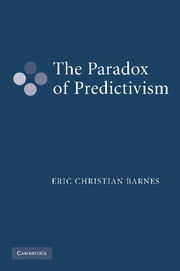Book contents
- Frontmatter
- Contents
- Acknowledgments
- Chapter 1 The paradox of predictivism
- Chapter 2 Epistemic pluralism
- Chapter 3 Predictivism and the Periodic Table of the Elements
- Chapter 4 Miracle arguments and the demise of strong predictivism
- Chapter 5 The predicting community
- Chapter 6 Back to epistemic pluralism
- Chapter 7 Postlude on old evidence
- Chapter 8 A paradox resolved
- Glossary
- Bibliography
- Index
Chapter 4 - Miracle arguments and the demise of strong predictivism
Published online by Cambridge University Press: 22 September 2009
- Frontmatter
- Contents
- Acknowledgments
- Chapter 1 The paradox of predictivism
- Chapter 2 Epistemic pluralism
- Chapter 3 Predictivism and the Periodic Table of the Elements
- Chapter 4 Miracle arguments and the demise of strong predictivism
- Chapter 5 The predicting community
- Chapter 6 Back to epistemic pluralism
- Chapter 7 Postlude on old evidence
- Chapter 8 A paradox resolved
- Glossary
- Bibliography
- Index
Summary
INTRODUCTION
Once again, let us begin with the fantasy of you suddenly becoming rich, and seeking financial advice. You choose an advisor with a long string of successful predictions about which investments will be successful over another who can merely accommodate the data with his theory. The successful predictions testify to the greater credibility of the predictor, you say. But how confident should you be that the predictor's theory is actually true? Could the predictor, say, have a false account of the causes of market fluctuations which for some reason happens to systematically generate true predictions? In this chapter we consider the role of predictive success in arguing for the truth of theory.
Thus far we have approached this problem in two ways: in Chapter 2 I developed a general case for the prevalence of pluralism in scientific theory assessment and argued that pluralism provides a straightforward rationale for predictivism. In Chapter 3 I proposed a taxonomy of predictivisms explicated partly in a Bayesian framework. But predictivism is a sufficiently complex topic that it can be and has been approached from still other perspectives in philosophical literature. Another of these perspectives is supplied by the longstanding realist/anti-realist debate. As is well known, there is a long tradition stretching back to William Whewell of defending realism by appealing to the epistemic significance of novelty (cf. 1.4.1), a tradition that remains very much alive today.
- Type
- Chapter
- Information
- The Paradox of Predictivism , pp. 123 - 167Publisher: Cambridge University PressPrint publication year: 2008

